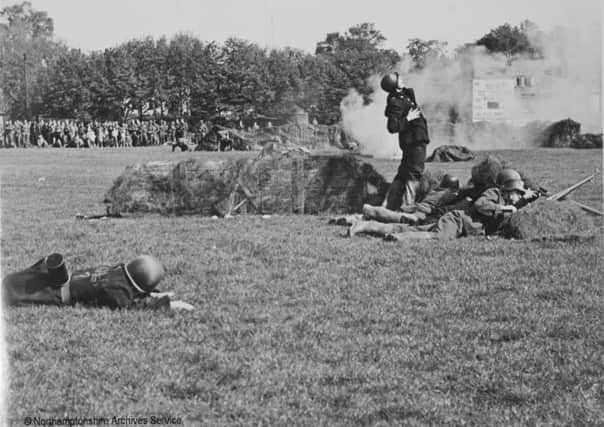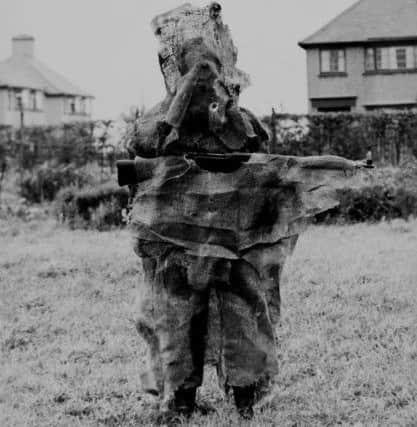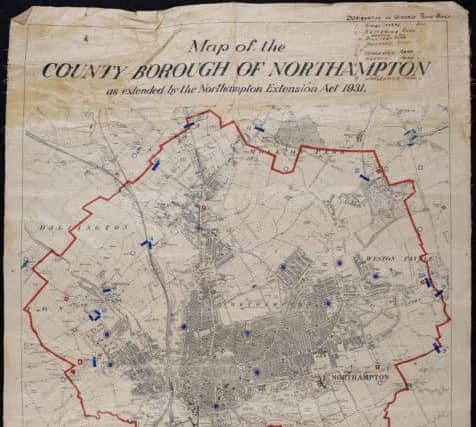Revealed: Secrets of '˜Dad's Army' of Northants


The show and its characters and catchphrases have become so familiar that it is difficult to imagine a picture of the Home Guard during the Second World War that is not defined by the comic antics of Captain Mainwaring and his platoon; but do the historical records of Northamptonshire’s Home Guard held at the County Record Office reveal a different story?
This bizarrely camouflaged Northamptonshire rifleman (left) would have raised laughter on the TV programme, as would the idea of a Home Guardsman from Yardley Gobion who, in an exercise, disguised himself as a woman, concealing a bomb in a bouquet of flowers with the aim of blowing up the enemy HQ.
Advertisement
Hide AdAdvertisement
Hide AdEqually comic is the suggestion in a training manual in the records that a handkerchief with a stone tied in it might be used as a ‘vital weapon’ against the modern, mechanised army of expected enemy invaders.


Some of the local scares surrounding German paratroopers also had their funny side: a supposed sighting of parachutes coming down at Kettering turned out to be swans descending on a lake in Wicksteed Park, while the parachutes spotted at Thorpe Mandeville were actually parts of haystacks caught up in a violent gust of wind.
Yet despite the laughs, the word ‘Secret’ written on many of the operational orders in the archives is a reminder of the time of extreme crisis in 1940 when a German invasion seemed imminent.
Nearly 500 volunteers attended the first parade at Northampton Drill Hall on May 26, 1940, following the appeal for men aged 17 to 65 made by War Secretary Anthony Eden a few days earlier.
Advertisement
Hide AdAdvertisement
Hide AdThe defences of the town were quickly put into place, with the Home Guard taking responsibility for setting up concrete cylinder road blocks and guarding vulnerable points, as illustrated on this original map from the time (right).


Public utilities, such as the gas, water and electricity works, were guarded, and road blocks were established in locations like West Bridge, Spencer Bridge, the Bedford Road by Becket’s Well and on the Weedon Road by what was then called the Red House inn.
It is now possible to read what were once closely guarded secrets: one list of orders concerns the arrangements for ringing church bells – the signal the enemy had invaded.
Number 1 Platoon of ‘A’ Company of the Northampton Battalion were to be responsible for the St Matthew’s Church bells, retrieving the key to the belfry from the ARP wardens’ post in the crypt with the password, “Belfry”, while number 3 Platoon’s password to the bells at Holy Trinity Church was “Cherry”.
Advertisement
Hide AdAdvertisement
Hide AdWhen the invaders from the air did arrive it was not in Northampton but in the village of Denton. There, on September 6, 1940, a suspicious man lying dazed and in a ditch was reported to a member of the local Home Guard, who challenged him. The bespectacled stranger, who was wearing a raincoat and felt hat, replied in perfect English, but the alert volunteer’s suspicions were aroused by the unusual style of knot in his tie, as well as the fact his forged identity card was written in the continental way, with the street name first.


Further investigation revealed that the stranger carried a loaded pistol.
When this was seized, he is reported to have said, “I give up”, remarking that on landing at night by parachute he had struck his head on his suitcase, knocking himself out. The suitcase contained a radio transmitter; the man also had a compass, maps and £300 in English notes.
Northamptonshire was not in fact the spy’s target; his papers were forged with a Birmingham address, and he imagined he had been dropped near Stratford-on-Avon.
Advertisement
Hide AdAdvertisement
Hide AdThe 20,000 men who served in the county’s Home Guard did valuable work in releasing regular soldiers from routine home defence duties, and the fact older men felt involved in the war effort helped to maintain morale.


How effective the Home Guard would have been in the event of an invasion is one of history’s unanswered questions: would the Germans have succumbed as easily as this photo of a display at the County Ground suggests (facing page)?
Thanks to the Northamptonshire Archive Service for this article